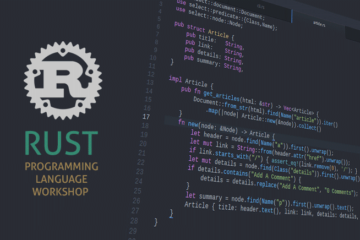Welcome, fellow adventurer, to the exciting world of Rust programming! If you’re looking to embark on a journey into the realm of systems programming, Rust is your trusty steed, and Cargo is your map and compass. Fear not, for I shall be your guide through this wild terrain, filled with pointers, lifetimes, and ownership rules.
What in the Rustic World is Rust?
First things first, let’s get acquainted with our protagonist: Rust. Rust is a systems programming language that aims to provide blazing-fast performance while ensuring memory safety and preventing data races. In simpler terms, it’s like the swiss army knife of programming languages, offering both high-level abstractions and low-level control.
Meet Cargo: Your Trusty Companion
Now, let’s talk about Cargo. Imagine Cargo as your loyal sidekick, always ready to lend a helping hand. It’s Rust’s package manager and build system, rolled into one convenient tool. With Cargo, you can create, build, and manage your Rust projects effortlessly.
Setting Up Camp: Installing Rust and Cargo
Before we set off on our grand adventure, we need to ensure Rust and Cargo are installed on our system. Fear not, for the process is as smooth as butter on a hot skillet.
To install Rust and Cargo, simply head over to rustup.rs and follow the instructions there. Once you’ve rustled up Rust and Cargo, you’re ready to rustle up some code!
Let’s Rustle Up Some Code!
Now that we have our tools at the ready, let’s dive into the fun part: writing some Rust code! Fire up your favorite text editor or IDE, and let’s create our first Rust project.
Open your terminal and navigate to your desired project directory. Once there, run the following command to create a new Rust project:
cargo new rust_adventure
This command creates a new directory named rust_adventure, containing the necessary files for a Rust project. Let’s navigate into our newly created project directory:
cd rust_adventure
Ah, the air smells fresher already, doesn’t it?
Hello, Rust World!
Now, let’s create a simple Rust program to greet the world. Open up the src/main.rs file in your favorite editor and replace its contents with the following Rust code:
fn main() {
println!("Hello, Rust World!");
}
Save the file and close your eyes for a moment. Can you hear the whispers of the compiler, eagerly waiting to bring our code to life?
Cargo to the Rescue!
With our code written, it’s time to call upon our trusty companion, Cargo, to build and run our program. In your terminal, navigate back to your project directory if you’re not already there, and run the following command:
cargo run
Behold! As if by magic, Cargo springs into action, compiling our code and executing it. You should see the glorious message: “Hello, Rust World!” printed to your terminal.
Conclusion: Onward, Rusty Adventurer!
And there you have it, fellow traveler! You’ve taken your first steps into the wild and wonderful world of Rust programming with Cargo by your side. But remember, this is just the beginning of your journey. There are countless treasures to uncover, challenges to overcome, and bugs to squash.
So, arm yourself with your trusty compiler and venture forth into the vast expanse of Rust. Who knows what wonders await you on your coding odyssey?
Until next time, happy coding, and may your code be as sturdy as Rust itself!



0 Comments